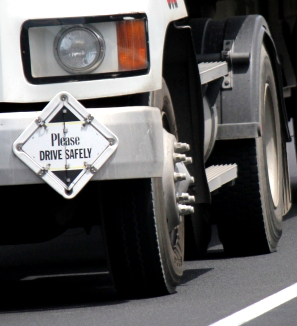Union says ALC misguided on RSRT talks
 The Australian Logistics Council (ALC) and the Transport Workers Union (TWU) are standing-off once more over safe rates of pay.
The Australian Logistics Council (ALC) and the Transport Workers Union (TWU) are standing-off once more over safe rates of pay.
The ALC has again pointed to Britain’s operator licensing scheme, telematics and Chain Of Responsibility as measures that should be taken on in Australia.
“Claims that the Road Safety Remuneration Tribunal is the only solution to improving heavy vehicle safety detract much-needed focus from a range of measures that, in industry’s view, would have equal or superior safety and compliance benefits,” ALC managing director Michael Kilgariff says.
“To improve safety, there needs to be a greater effort to ensure all supply chain participants meet their Chain of Responsibility obligations, coupled with the implementation of a number of targeted and practical measures.
“For example, ALC would welcome greater investigation into the safety benefits of introducing an operator licensing scheme in Australia.
“In a number of other countries, licensees have to demonstrate compliance with technical, safety or financial fitness requirements specified by the regulator.
“These requirements could be considered as a means of regulating the ‘quality’ of operators.
“The United Kingdom’s operator Licensing system maintains high standards of safety by ensuring licence holders are professionally competent, or that they employ someone who is professionally competent.
“ALC has also long encouraged the NTC to investigate the potential benefits of using in-vehicle telematics as a way to monitor driver fatigue and speed of heavy vehicles.
“The use of monitoring systems embracing telematics for compliance purposes should be mandated for heavy line-haul vehicles as part of a company’s compliance with their Chain of Responsibility obligations.
But the TWU says these measures do not approach the real issue - late payments.
The union says the RSRT should focus its efforts in this area.
The TWU’s RSRT submission notes “four-month payment terms equate to a significant percentage off already wafer thin margins”.
“This is another example of those entities at the apex of transport supply chains placing pressure on the industry, in this case by squeezing interest-free elongated payment terms that some operators are saying is putting them out of business,” the submission adds.
The TWU says voluntary codes should not take the place of binding legislation and enforceable orders.
“The Road Safety Remuneration Tribunal has proved is the only body which can investigate all issues which impact on safety in transport. It is the body which can hold all of the major companies using transport operators to account over low cost contracts,” TWU assistant national secretary Michael Kaine says.
“It is in the interests of transport operators to support the Tribunal so the squeeze on them is exposed.
“The Australian Logistics Council is doing its members a disservice is opposing the Tribunal.
“Is the Australian Logistics Council now acting as the mouthpiece of the likes of Coles in allowing them off the hook from real scrutiny of their supply chains?”
The TWU argues that employers, governments and trade unions at the United Nations’ International Labor Organisation are backing safe remuneration and supply chain accountability based on the Australian model.
“We have achieved a unique system here that has the potential to make our roads safer,” Kaine says.
“The Australian Logistics Council must be part of this momentum instead of opposing it.”








 Print
Print